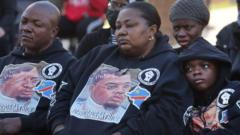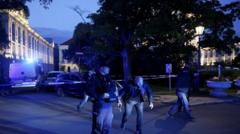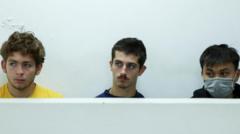Human rights organizations are pressing for investigations into the brutal actions of Kenya's police and army following a BBC documentary revealing the killing of protesters.
**Pressure Intensifies for Investigation into Kenya's Security Forces Following BBC Exposé**

**Pressure Intensifies for Investigation into Kenya's Security Forces Following BBC Exposé**
Calls for accountability grow as human rights groups demand inquiry into police and military actions during protests.
In the aftermath of the June 25, 2024 protests in Nairobi against rising taxes, prominent rights groups like Amnesty International and the Kenya Human Rights Commission (KHRC) insist that personnel identified in the exposé should be held accountable. The outrage stems from the shooting deaths of three demonstrators by security forces as Parliament convened to discuss a controversial finance bill aimed at raising $2.7 billion.
The BBC Africa Eye investigation detailed how uniformed officers responded with deadly force against largely peaceful protesters. Following the unrest, claims emerged of at least 65 people dying, alongside hundreds of detentions, with authorities facing accusations of excessive violence against civilians.
Government spokesperson Isaac Mwaura responded to the BBC findings by asserting that every life is important. He criticized the documentary as biased and unbalanced, suggesting it minimized the extent of the vandalism that took place during the protests. Meanwhile, opposition lawmakers condemned the government's response, emphasizing the need for an honest dialogue about the police's conduct.
Despite calls for transparency, no security officers have yet faced charges, and the Kenyan Defence Forces (KDF) stated they had not received requests for inquiries regarding any of their personnel. Amnesty International cited the documentary as further evidence of unnecessary force, calling for an independent investigation into these incidents.
As public anger mounts, Kenyans across social platforms are demanding justice for those killed and injured during the protests. The IPOA has reported that it is still actively pursuing investigations into numerous deaths, while political tensions continue to rise around the handling of the aftermath of the demonstrations.
Legislators have indicated a split in public opinion, with some suggesting that media reports like BBC's could incite further unrest, while others affirm the necessity for transparency and accountability in law enforcement practices. As the situation develops, the demand for a thorough inquiry remains at the forefront of national discourse in Kenya.
The BBC Africa Eye investigation detailed how uniformed officers responded with deadly force against largely peaceful protesters. Following the unrest, claims emerged of at least 65 people dying, alongside hundreds of detentions, with authorities facing accusations of excessive violence against civilians.
Government spokesperson Isaac Mwaura responded to the BBC findings by asserting that every life is important. He criticized the documentary as biased and unbalanced, suggesting it minimized the extent of the vandalism that took place during the protests. Meanwhile, opposition lawmakers condemned the government's response, emphasizing the need for an honest dialogue about the police's conduct.
Despite calls for transparency, no security officers have yet faced charges, and the Kenyan Defence Forces (KDF) stated they had not received requests for inquiries regarding any of their personnel. Amnesty International cited the documentary as further evidence of unnecessary force, calling for an independent investigation into these incidents.
As public anger mounts, Kenyans across social platforms are demanding justice for those killed and injured during the protests. The IPOA has reported that it is still actively pursuing investigations into numerous deaths, while political tensions continue to rise around the handling of the aftermath of the demonstrations.
Legislators have indicated a split in public opinion, with some suggesting that media reports like BBC's could incite further unrest, while others affirm the necessity for transparency and accountability in law enforcement practices. As the situation develops, the demand for a thorough inquiry remains at the forefront of national discourse in Kenya.




















